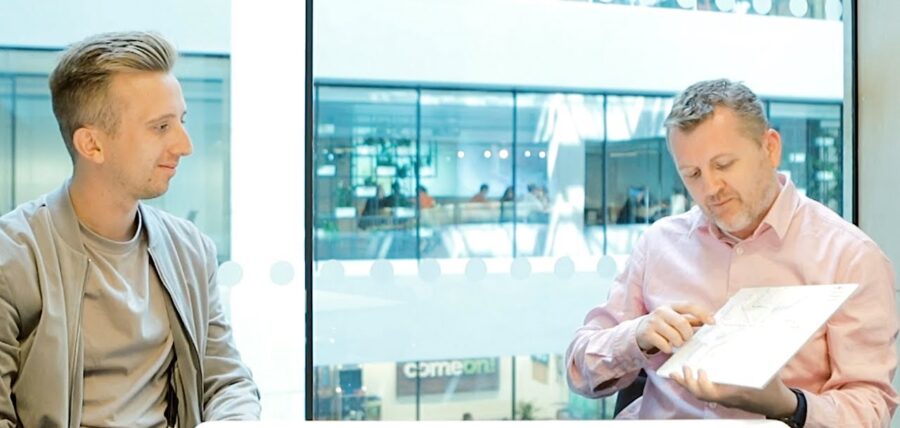Earlier this year, Paul had the opportunity to speak to Carl Garner, an educational psychologist and creator of the Emotional Intelligence Mapping. In this interview we dive into what brought Carl to his current exploration of emotional mapping, how exactly it can be useful, and what we need to consider when it comes to emotional support moving forwards.
Enjoy…
Obviously I have lots of questions for you but firstly I want to find out a little more about you, what are you doing right now?
Well currently I am retired! I write books and programs specifically on emotions and mapping.
You look too young to retire!
I retired at the age of 39 so I was very fortunate. My journey began at that stage. I always thought it was going to be “once I made a million that was it” and retire and finish and I remember my father saying at the time you’re too young to retire, you haven’t got enough money.
So I asked him – how much would be enough? 2 million? 3 million?
That’s when things started going downhill. I always thought that when I reached my goal I’d be happy. I’ve made my million and that’s it. But it wasn’t. As much as I enjoyed the engagement and family time, I missed adult engagement and a journey.
It was at that moment I probably recognized I had spent 6 months being quite depressed. Getting to the end of the journey isn’t what makes you happy, it is the journey itself. I had to reinvent and find a new journey and that’s what led me to being much happier and content in my life.

I can relate to that. It’s like the purpose and meaning has been taken away and you don’t know how to navigate it. What was the next stage from that dark place?
I was very fortunate that I’ve got a strong supportive family. My wife turned around and said we need to find a way of adding value. We were focusing on adding value to me or to my family but it was when we decided to look at it a bit different – to add value to others – that we realized that would be the groundbreaking move. We started a company that was about adding value to everyone else and that’s where things snowballed.
How did this business come about?
It wasn’t just mine! We looked at the neurons in the brain. There are 86 billion neurons in the brain which is an enormous amount. When it comes to our emotions, how those are mapped out is really convoluted. Then we looked at Harry Beck’s method who made the underground map famous. He took London, the maze of a to b and simplified it. We had a brain child of “why don’t we simplify emotions”, something hard to navigate.
Can you share examples of how someone would use this map. If I was an employee struggling with stress, how would this help me?
I’m going to share a new theory – compartmentalization. This focuses on how we compartmentalize emotions. Not just put them to one side. I was with a pair of clients and at the time my phone kept buzzing in my bag. Because it was persistent I asked permission to answer the call. They said please go ahead! I answered and she said my dad has cancer. To give context, my mum and dad are my best friends and very important to me. At that moment I said to the client – now is the time to do emotional compartmentalization. The asked if this really was the right time… and I answered, absolutely it is, I’ve got to get into my car shortly and be in the right headspace!
I talked to the client and said where do you think I am on the map? He started to point out different emotions I was experiencing – there was one that made us laugh – he said you are probably overwhelmed.
We use the map to point out things like where are you frustrated? Guilty? What we do is name the emotions and verbalise them, and then we have the option of locating them and visualizing them. Now I can tell my emotions its ok – we can validate them – and tell them that we can unpack later.
Then pragmatism – when we get to the “car”, what emotions should be employed before I drive? I can pre-programme myself in the car to remain calm and smiling, proud and content to be in control of my emotions. I can honour my promise to unpack the emotions… Then allow myself to cry.

Does this feel more natural the more you practice it?
When it comes to emotions you need to be able to detach, so you can later reattach. Otherwise you’ll get emotional stagnation, which will later resurface. This is shown in “short tempered” people. They are not short tempered, they just don’t know how to handle their emotions which have been stagnant and it takes something small to trigger anger. Often there is a whole flask of emotions that have been poured in that haven’t been dealt with.
People can often let things build up and up when it comes to emotions. What is your advice on dealing with that at the beginning?
It’s tough. I think the first element is that it is all well and good telling someone to talk… at that moment you want to stay internalized. You don’t want to open up. It’s difficult. But if you can find someone to connect with, that is what is important. But how do we connect with the right person? There is a difference between empathy and sympathy or people wanting to fix your problem, or one up-man ship which lead to loss of connection. Yet if someone came to you and said thank you for sharing, it can be more powerful because then you’ve built the connection and you can share in your time and not someone else’s timeframe. My advice is try and find someone you can connect with.
I like what you said on empathy and sympathy there. There is a huge difference but I think it blurs into one sometimes. What would you say the difference is between the two?
Sympathy is about feeling sorry for someone, empathy is connecting, nothing else. Just about listening and understanding. Imagine if you could feel how I could feel, you’d have a different mindset. Sympathy is feeling sorry for the experience, which isn’t good enough. I want you to be able to feel how I feel.

Can everyone adopt empathy or is this something you’ve developed over the years?
You can definitely develop it. I had a psychometrics test done many years ago on myself and they found that when it came to my empathy I was quite low and effectively what happens is, you can engage in empathy as you’re trained to but your natural “setting” might not be empathy. You have to practice this on as many people as you can from a diverse pool. Some people are just so naturally gifted with empathy.
Is there a downside to empathy? What I’ve had to learn is the opposite. Sometimes I have too much empathy and it can bring me down. It’s getting the balance right!
What you’ve just sad I can really relate to. In my job I’m looking at body language, tone of voice, pace of voice, intonation, looking at all these things and its quite intense. These sessions are 45 minutes and anything more would be too draining. If you’re making a habit of being empathetic all the time you naturally take on a lot of excess baggage. What I notice is when I come back to England my stress levels are heightened and there is a bleed off from everyone else. In Saudi Arabia the people are less stressed and have a different focus on family, and work is a byproduct. In England our focus is very much I’ve “got to work for something”.
Lets talk about that. A big part of what you’re trying to do is tackle the stigma in the workplace. What do you think companies need to be doing to better the mental health of their employees?
I think firstly I’d love to see more MHFAs. I’ve seen the concept and I love the idea. We should be saying “I’ve seen your performance measures, is something going on? How are you feeling?”. When we ask questions we are promoting connection. We can still have conversations around performance but phrased differently. I want to improve your performance but if I focus on you as a person I can focus on adding value to you.
There still seems to be this one size fits all approach. What do you think?
Absolutely. Its about asking the valuable questions to find out how that person is, what are they going through, how can we support them? Currently, with mental health, we are all very reactive. For example, there is no point us going to the gym when getting close to obesity, we should go NOW for the betterment of health. We do these things for maintenance but with mental health we are just reacting a lot of the time. We should take mental health and label it in such a way that it is cool to train your health.
We need to look at the ways we talk about mental health and what it means. At the moment people perceive it as something negative which isn’t accurate or helpful. I would like to see a point where mental health is discussed openly. Do you see this being the case?
I do. When I look back I can see things progress more since I went to Saudi Arabia. I’ve been there for 6 years now, and when I come back I see MHFA and now there are programs and I love seeing it. I think there needs to be good dialogue with senior people about being proactive about mental health and discussing what actions we can take on that. Then it would help the people that are struggling who need the first aiders or who need to see psychologists. I think that would be powerful.
I think it comes back to short-term resolves over long term change. If we are changing the culture, it will take time and it will cost money but eventually you wont be reacting as much.
Yes you’ll end up saving a fortune. The problem is there is not enough qualitative research done on this. Businesses are looking at numbers and figures. There needs someone to step forward and do research here so we can help people see how much they’ll save on recruitment, HR, sickness. If someone asks how are you feeling and you say “wow, I’ll talk to all my colleagues about how supportive you are” we won’t be sick. We want to avoid disconnect between the corporate world and the individual. If the corporate world focuses on the individual then the individual will focus on the corporate world.
Mark (from the place we are recording from) is very proactive about mental health. He wants things to change and one of the staff members was telling us that despite KPIs she feels valued and flexible and not just a piece in a machine that’s churning out money. It doesn’t take away from the business.
There are a lot of top CEOs that would agree with this. Look at Richard Branson, it was lovely when he was being interviewed and he was asked about his customers. He said it is very much about customers, but the customers are not who you think. My customers are my employees. I focus on my customers because they’ll then focus on the other customers, which will benefit me.
Lets talk about emotional intelligence. I was just reading on the train about that it is something companies need to focus on over IQ. People who have EQ make more money. What is your take on it?
It depends on the research on it. EQ research is sometimes misquoted when people say that 80% of success can be determined by EQ, that’s not quite what happened! They actually found that 20% was attributable to IQ. We have to look at how we quantify and qualify success. It often happens that the memorable people are people with high EQs not high IQs. When we look at the people who run our countries, they have high EQ.
Do you think this EQ starts at school?
I wish it did! I think in my generation there was a lot of social and emotional development built into play. The focus was purely on relationships. Now I think we’ve become more connected with the mobile world but we’ve also never been more disconnected. Schools are mostly being judged with KPIs – they want to do more emotional intelligence building, but they don’t have the time. I’ve spoken to teachers and educational leaders but they are often judged on their results.
Parents in private sector have to also take responsibility, because as much as they say that this (emotional intelligence) is what they want, they won’t be happy if the children don’t get As. We are failing our children globally.
There was research done on GCSE students and they took the top marking students – A*s and A grades – then they did the same exam 3 months later and 80% failed the exam which shows it reflects short term memory. We need to start focusing on emotional literacy, supporting empathy, developing EQ.
Do you think that means taking exams away?
Lets look at industry. Industry doesn’t look just at sales now. It looks at the human element with the facts and figures. Why are we not doing this for our children? A master’s degree holds little value in today’s industry. When I was young my dad would say work hard and get your grades to go to college, then to university, then to get a job and he was right but this has changed for my children. I can’t do that anymore. We are failing our kids globally as we’re not preparing for them for life later on.
Thank you for sharing with us!
We hope this interview has given you some insight as to how best to manage stress in the workplace – for yourself and colleagues! We’ll be posting many more interviews that focus on wellbeing in the workplace. If you’d like to get in touch about the free trial of our Everymind app you can do so here.








